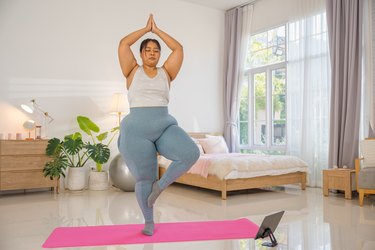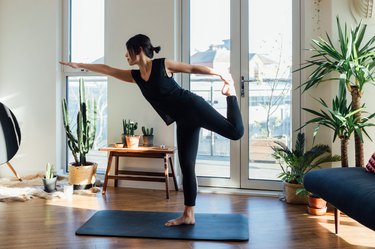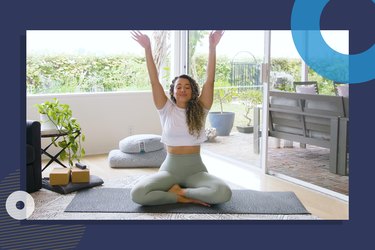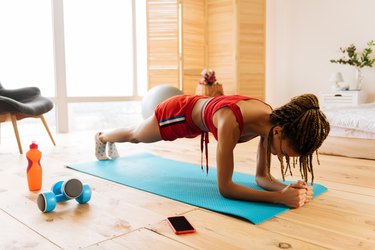
Your lower body is quite literally a powerhouse. Often referred to as our "foundation" for the way these muscle groups hold us upright, our bottom half houses some of the largest muscles in the entire body (the glutes and quadriceps). These muscles not only keep us standing tall, but propel us into forward motion.
When this foundation is strong and flexible, it also supports our natural ability to move dynamically, so we are able to run, jump, kick, balance, dance and more, all without a serious risk of injury.
Video of the Day
If you're young and able-bodied, the idea of falling might not even cross your mind. However, as we age, a weak lower body can lead to instability and increase the likelihood of falling and getting hurt.
No matter your age, the good news is all you need to do to increase strength and improve balance is to challenge and activate the muscles of your lower body consistently over time to build a strong foundation for a lifetime of efficient and enjoyable movement.
Why Practice Yoga to Build Lower-Body Strength?
Flexibility without strength limits range of motion and puts you at greater risk of injury — doing yoga gives us both.
The authors of a small January 2016 study in the International Journal of Yoga state "yoga is an activity that can simultaneously enhance several specific components of fitness" because it strengthens and lengthens your muscles and tissues.
They go on to say that because yoga helps increase flexibility by loosening your connective tissue (fibers that surround organs and help maintain muscle form), the load placed on your ligaments and joints becomes less. "In this way, new movement options become possible as connective tissues become laxer, muscles become more active and joints move more freely."
How to Do This Workout
In this 20-minute yoga flow, you'll practice a series of postures that target the lower body's four main muscle groups: the quadriceps, hamstrings, glutes and calves. Throughout the flow, try to notice how these poses activate and stretch your muscles.
Move through this flow once all the way through and notice how you feel. Make sure to do the pose on both sides and repeat it up to a total of three times maximum. Try it once or twice a week to complement other activities or focus on strength building. Breathe steadily while doing each pose and also during transitions between poses to increase the flow of oxygen to your muscles and improve your staying power. Remember to always exit a pose if you feel extreme discomfort or pain.
As you make this workout a regular part of your yoga practice, try to hold each pose a moment or two longer to build stamina.
Check out more of our 20-minute workouts here — we’ve got something for everyone.
The Workout
1. Bird Dog Pose (Dandayamana Bharmanasana)
- Begin on your hands in knees in a table top position. As you inhale, elongate your spine, and on the exhale, draw your navel in and up to stabilize your core.
- Inhale and reach your right arm forward and stretch your left leg back, keeping your toes on the mat.
- When you feel ready and well-balanced, lift your back leg up to hip height.
- Press down into the hand and leg that are still on the mat for support and reach your lifted hand and leg away from each other.
- Hold here for 3 rounds of breath (one round is one inhale and one exhale), then slowly lower the arm and leg.
- Repeat on the other side.
2. Chair Pose (Utkatasana)
- Begin standing with your feet hip-width distance apart or wider.
- Inhale to stand tall and exhale as you bend your knees into a half squat until you feel a reasonable challenge in your legs and torso.
- Place your hands on your hips or in a prayer position at your chest for less of a challenge, or raise them overhead for more of a challenge.
- Keep the weight in your heels and press down into the mat to activate your glutes.
- Hold here for three rounds of breath and press back to a standing position.
3. Crescent High Lunge Pose (Ashta Chandrasana) to Chair Pose (Utkatasana)
- From standing, lower down into chair pose (demonstrated above) with your hands on your hips.
- Lean your weight into your right foot and step your left foot behind you into crescent high lunge until you feel a decent stretch in your front (right) hip and thigh.
- Press down firmly into your front (right) heel and step your back (left) foot forward to return to chair pose.
- Lean your weight into your left foot and step your right foot behind you into crescent high lunge. Inhale and step your back (right) foot forward to return to chair pose, sitting deeply into the pose as you exhale.
- Repeat three times on each side.
4. Warrior III (Virabhadrasana III)
- Begin in crescent high lunge pose (demonstrated above) with your right foot forward and your left leg back behind you.
- Place your hands on your hips and inhale to elongate your spine.
- As you exhale, bend your left knee and lean forward into your right leg to lift your left leg off the mat.
- Press down firmly into your right heel and hug your outer right hip in towards your midline.
- Keep your hands on your hips for better balance or bring them to a prayer position in front of your chest.
- Hold for three rounds of breath, lengthening your spine as you inhale and pressing your back leg up to activate your hamstrings as you exhale.
- Slowly lower the back leg down to the mat.
- Repeat on the opposite side.
5. Warrior II (Virabhadrasana II)
- Begin in crescent high lunge pose with your hands on your hips.
- Pivot your back foot down so your heel is on the ground and your toes point toward the long edge of the mat.
- Turn your hips and open your chest away from your front leg and inhale to elongate your spine.
- Bend your front knee so your front shin is vertical to the mat at a 90-degree angle.
- Press down firmly into the mat and inhale to elongate your spine.
- Stretch your arms out wide and gaze over your front middle finger.
- Hold here for three to five breaths in total.
- Repeat on the other side.
6. Goddess Pose (Utkata Konasana)
- Begin in a standing wide-legged position facing the long edge of your mat.
- Pivot your heels in and turn your toes out as much as you can.
- Bend your knees to lower your pelvis and bring your shins to a vertical position.
- Press your knees out to the side to activate your outer hip muscles, stretch your inner thighs and press down firmly into your heels for balance.
- Place your hands on your hips or in a prayer position at your chest.
- Inhale to elongate your spine and exhale to sit lower.
- Hold for three to five breaths.
7. Tree Pose (Vrksasana)
- Begin standing with your feet hip-width distance apart.
- Place your hands on your hips or use a wall or chair for balance.
- Lean your weight into your left foot and bring the bottom of your right foot to your inner left ankle.
- If you feel steady, slowly draw your right foot up to rest below your left knee. Or, you can increase the balancing challenge by placing the sole of your right foot on your inner left thigh.
- Squeeze your inner thigh and sole of your foot together to stabilize your body, and hug your outer left hip in toward the midline of your body.
- Inhale to elongate your spine. Exhale to press down firmly into your standing foot.
- Hold for three breaths.
- Repeat on the other side.
More Yoga Workouts You'll Love
Was this article helpful?
150 Characters Max
0/150
Thank you for sharing!
Thank you for your feedback!


